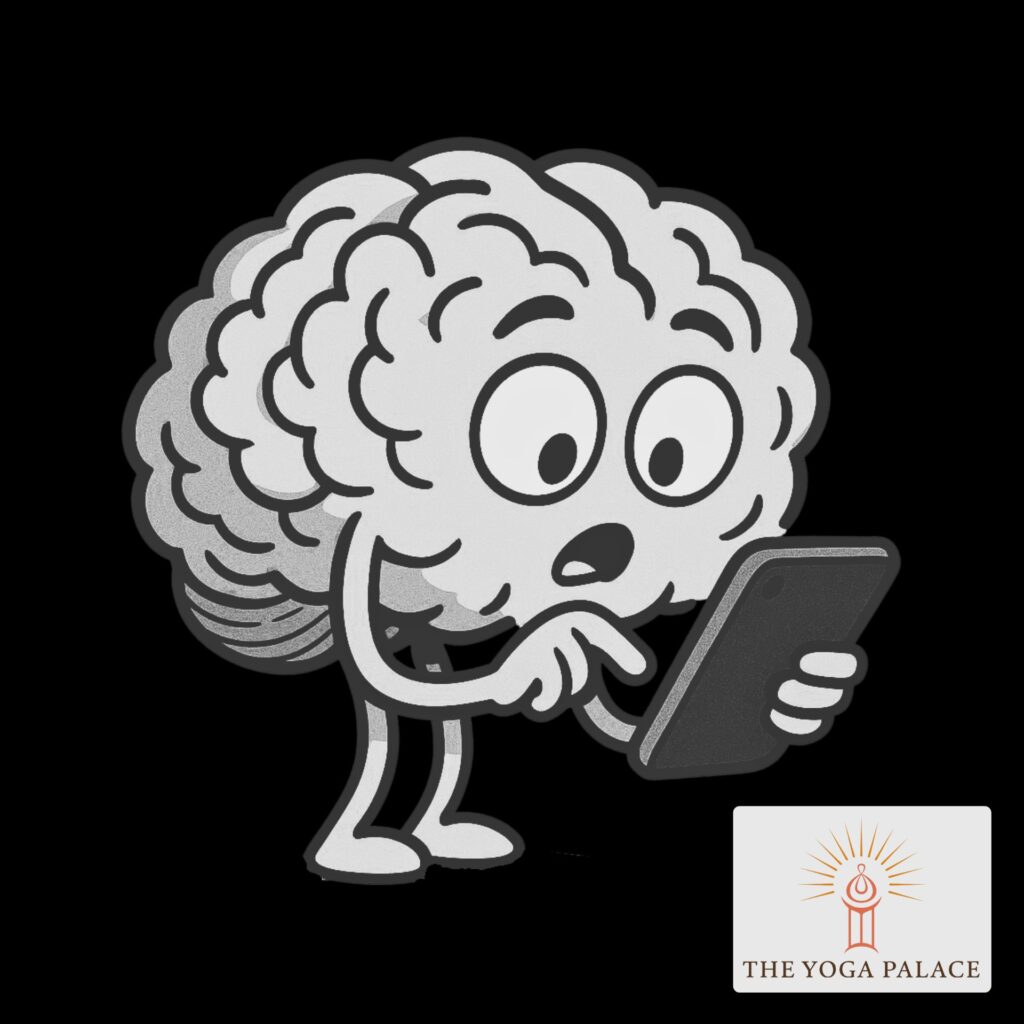Flicking from one thing to another, in search of cheap thrills but finding nothing satisfactory. Occasionally stumbling on something that fires off your emotions: a pinch of lust, a dash of anger, a touch of envy, a glimmer of hope… but the feeling evaporates as soon as it arrives and you are on to something else. If you practice meditation, you may start to notice that your mind is just like a bored doom-scroller on social media.
Perhaps the reason that doom-scrolling is so addictive is that those diabolical big tech overlords figured out a way to monetize the regrettable tendency of the human mind to wander around hopelessly on a futile quest for kicks. This restless quality of mind is certainly recognized by the great meditation masters. The mind has been compared to a drunken monkey stumbling from branch to branch, in fact one Sanskrit saying goes as far as to say the mind is like a monkey that is not only drunk, but reeling from a scorpion bite AND possessed by evil spirits. Basically, it is out of control: driven by external and self-inflicted pains, hazy hopes and vague dreams.
The Pattern of Mental Fragmentation
When the mind has gone a-wandering, most of the thoughts it stumbles into are of no value whatsoever: they cannot improve your life, they cannot relieve your suffering, they do not motivate you to wholesome actions. Just like those social media posts or YouTube shorts, they waste your precious time. It is easy to get stuck in a pattern of this kind of fragmented and unhelpful thinking. In the same way, it is tempting to start your day by grabbing your phone and plugging into a load of stressful information, it is easy to wake up and begin the habit of mental rumination. In fact, what you do first thing in the morning can set you up for the rest of the day: so if you start with a nice routine or ritual to bring peace and awareness, you’ll carry these qualities throughout the day. If conversely, you start with worry, distraction, and hazy thoughts – you’ll likely repeat this pattern, making your day less enjoyable and more challenging.
Sometimes, when you pick up your phone to do one thing, like answer an important email, you end up doing 50 different things because you get distracted. In the same way, if your mind has a tendency to flit from subject to subject – it is hard to stick to a plan. Many people dream of making changes to their lives: learning a new skill, starting a business, developing an exercise routine, living a more meditative life, eating healthier and so on. But a lot of the time, even with the best intentions, they fail to make the change and, even when they do, they soon go back to their old ways. If this failure happens enough times, they will become dejected and not try anymore. The reason it can be hard to change is because, if we are thinking the same old thoughts, we are going to live the same old life.
The Trap of Mental Drama
Some people are natural daydreamers, with rich imaginations, who walk around with their “head in the clouds”. There is nothing wrong with this, we need people with this temperament. Thinking, imagining, daydreaming is all fine. The problem is when we are having thoughts that lead nowhere, stir up emotions, and snowball as the habit becomes more and more ingrained. Many people find that, when they start to meditate or engage in mindful practices, they become aware that many of their thoughts are unwholesome, being neither conducive to spiritual practice nor worldly attainments. And these thoughts tend to be recycled from the previous day, with a kind of pointless domino effect going back an entire lifetime (and maybe beyond according to eastern mystics). These thoughts provide an endless mental doom-scroll that can sabotage all our endeavors.
Today’s digital distractions externalize this mental tendency for repetitive and pointless drama. That 7-second YouTube short is going to do nothing for you other than provide a short distraction and emotional jolt. It is the same for many of the thoughts we have: we are churning over tiny little stories to trigger our emotions and keep ourselves occupied. You may have noticed that, in the online world, sometimes the most negative or rage-inducing bits of content get the most engagement. Why would we want to look at things that anger or disturb us? Because we are addicted to stimulation regardless of whether it is positive or negative.
It is the same when we think depressing or anxiety-provoking thoughts: they are painful but they have an addictive quality that keeps us coming back for more. Now, of course telling a person who is depressed or anxious that they are choosing this state of mind by having the “wrong” thoughts could come across as rather harsh. When somebody is stuck in this state, it certainly doesn’t feel like a choice. But, one of the things meditation can reveal is our tendency to cling to the stories that give us that emotional hit: be they positive or negative. Once a way of thinking becomes familiar, it becomes strangely comforting to the mind – even if it paradoxically leads to a lot of discomfort. Returning to the analogy of doom-scrolling: we know the practice is harmful, but we still do it, especially if it has become a habit.
The Power of Focused Attention
Sometimes talking about the wandering nature of the mind can give a false impression that the mind is a bad thing. But human minds have created many wonders: we are surrounded by technological and creative marvels. It is just that, when the mind is unfocused, it has a tendency to go around in circles. When we can focus on something, anything is possible. In fact, it is focused attention rather than random, “Eureka” moments that lead to humanity’s greatest achievements. When asked how he solved the problem of gravity, Newton was said to have replied, “By thinking of it all the time.” If his mind had been doing the 17th century equivalent of watching cat videos on YouTube, he would not have figured it out. Incidentally, something most people don’t know about Newton was that he was a devoutly religious Christian who also held all sorts of controversial and esoteric ideas about ancient divine wisdom encoded in nature and scripture. So, between trying to figure out the meaning of life and staying out of trouble with religious authorities, he was still able to basically invent modern physics. This was a guy who knew how to put his mind to good use!
Perhaps, the world would be full of geniuses if we could only learn how to keep that monkey-mind under control.
The Spiritual Perspective
From a spiritual point of view, learning to control the mind is also paramount. The literal definition of Yoga given by the Sage Patanjali and today found tattooed in Sanskrit on enthusiastic yoga teachers is: “Yoga is the cessation of the fluctuations of the mind“. You can see our article about this subject here.

The Buddhists believe that being born human is about as likely as pouring a bag of rice onto an upturned needle and one grain landing on it perfectly balanced: kind of like buying a lottery-winning lottery ticket, then buying a million more winning lottery tickets with the winnings. They also believe that this unfathomably rare existence is a precious opportunity to wake up to the true nature of reality – and to do this, we must learn to get the mind under control. If something like this worldview is true, we don’t have time to doom scroll in the digital or mental world.
It isn’t just eastern mystics that value a calm mind, the Catholic Monk Thomas Merton said , “‘The greatest need of our time is to clean out the enormous mass of mental and emotional rubbish that clutters our minds‘”. And he was writing decades before the current digital information storm in which we find ourselves. It makes sense from the perspective of any person with a belief in a higher power or sacred purpose to life, if your mind is full of clutter, how can you rise above worldly things?
Beyond Digital Detox
A lot of people engage in a digital detox, and that is a good thing to do. We recommend our guests at the Yoga Palace keep their phones on airplane mode as much as possible; some retreats will confiscate them entirely. More than a digital detox though, what we need is a mental detox. Getting rid of the phone will help, but the phone is just an externalization of our natural tendency to chase transient, temporary, and ultimately unsatisfactory things. Meditation is the best cure for this ailment, it teaches us to observe our thoughts without being swept away by them, to recognize the difference between useful thinking and mental noise.
Even if you are not inclined towards mysticism, learning to be able to calm and focus the mind will be hugely beneficial. As said above, new habits become possible when the mind learns to be less scattered. If you can learn to focus, to direct your thoughts towards your goals, whatever you want to achieve becomes possible; otherwise it is just a daydream.
The Surprising Speed of Mental Transformation
It may seem like a very lofty goal to transform your drunken monkey mind into that of a laser-focused genius or blissful monk. But meditation can get surprisingly fast results, and it is OK to start with just a short period and slowly work your way up. Even if the practice seems like a struggle, if you stick to it, you will start to notice a lot of things about your mind. You will notice that tendency pulling at you: the desire to pick up the phone and doom-scroll, the desire to pick up a pointless thought that will only lead to another, then another… When you sit in meditation, you will notice how the mind likes to wander off and do its own thing. The best thing about it is that you do not have to fight this tendency, just notice it and eventually a kind of magic happens. Sometimes people think they are bad at meditating or doing it wrong because they have to catch their wandering mind what seems like thousands of times in a single session. But, the practice isn’t to stop the mind, it is just to notice it.
Eventually, you’ll start to lose interest in the doom-scroll thoughts as you gain insight into their nature. You may find space for more creativity, focus, and peace. Just as you can learn to put down your phone and step away from the endless cycle of online drama, you can learn to detach from the mental chatter that keeps you trapped in old patterns.

